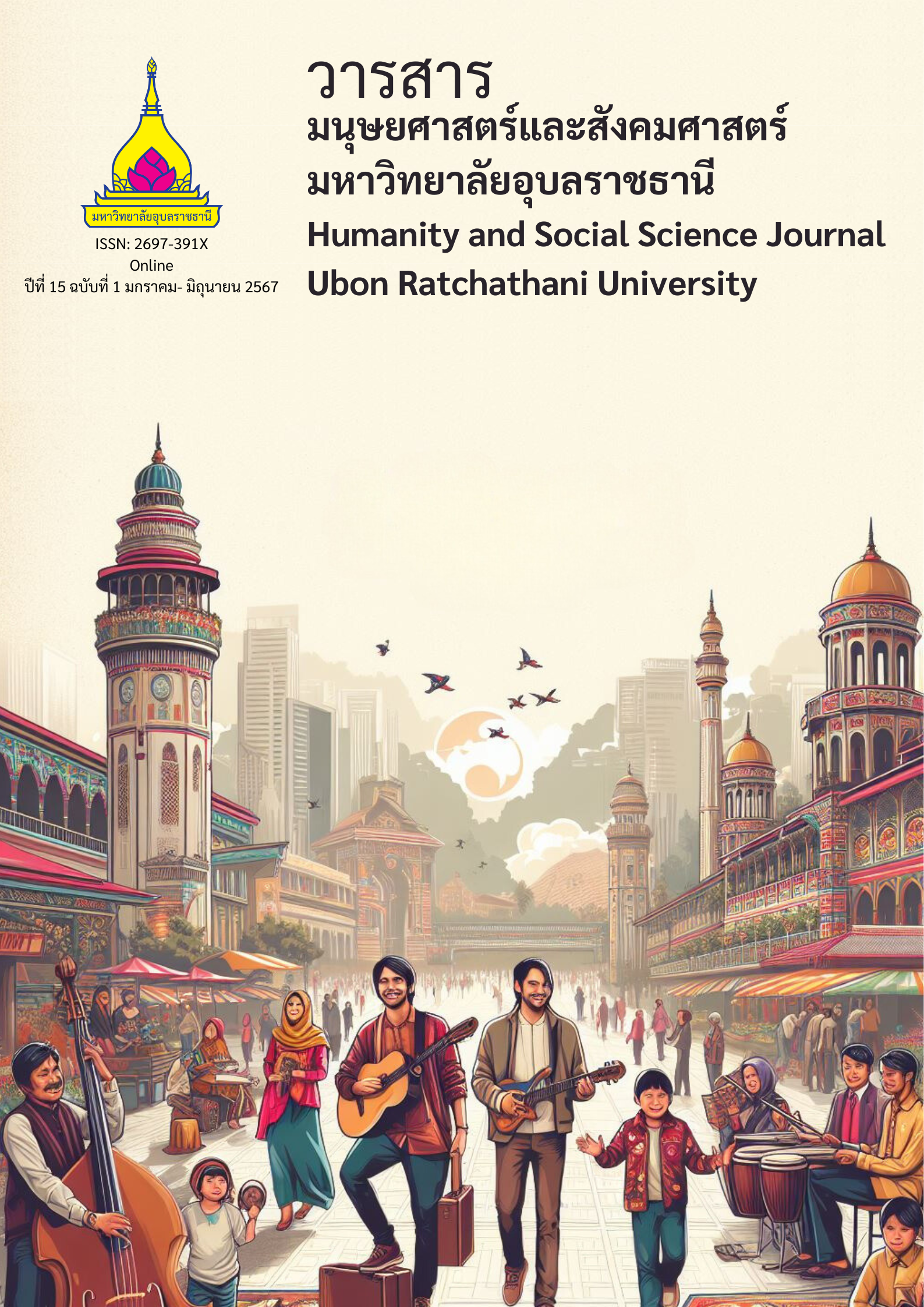สิทธิมนุษยชนในฐานะภาษาเชิงศีลธรรมและการเมือง ของชีวิตนักร้องตาบอด
Main Article Content
บทคัดย่อ
งานวิจัยนี้มีวัตถุประสงค์เพื่อตรวจสอบอุดมการณ์สิทธิมนุษยชนในฐานะที่เป็นโครงการทางศีลธรรมและการเมืองยุคปัจจุบัน เมื่อถูกแปลเป็นปฏิบัติการในระดับท้องถิ่นในบริบทสังคมไทย โดยองค์กรด้านการพัฒนาคนพิการภายใต้วาระการเคลื่อนไหวต่อสู้ทางสังคมการเมืองเพื่อปลดปล่อยคนพิการ งานวิจัยเก็บข้อมูลภาคสนามในกลุ่มนักร้องตาบอดทั้งที่เป็นนักร้องเดี่ยวและวงดนตรีตาบอด ในพื้นที่กรุงเทพมหานครและชานเมืองใกล้กรุงเทพมหานคร และสัมภาษณ์แกนนำ
องค์กรรัฐและเอกชน และเก็บรวบรวมข้อมูลจากเอกสารที่เกี่ยวข้อง ผลการวิจัยพบว่า หลักการสิทธิมนุษยชนที่ถูกเชื่อมโยงมาสู่ประเด็นศักดิ์ศรีความเป็นมนุษย์
ในกลุ่มคนพิการกลายเป็นภาษาเชิงศีลธรรมและการเมืองใหม่และได้สร้างกรอบชุดศีลธรรมหนึ่งเดียวในกลุ่มคนพิการตาบอด คนพิการที่ไม่สามารถปรับตัวตามเกณฑ์มาตรฐานคุณค่าที่ภาษาเชิงศีลธรรมของสิทธิมนุษยชนสร้างให้ จะถูกแบ่งแยก
และกีดกันทางสังคมในกลุ่มคนพิการตาบอดและถือว่าเป็นบุคคลที่ไม่มีศักดิ์ศรีความเป็นมนุษย์ที่สมบูรณ์ บทความชี้ว่าสิทธิมนุษยชนไม่ได้มีความเป็นสากลนิยม และสามารถสร้างมาตรฐานเชิงคุณค่าใช้ตัดสินความเป็นมนุษย์ที่ไม่เท่าเทียมกันในกลุ่มประชากร เราจะเข้าใจประเด็นนี้ได้ด้วยการศึกษาสิทธิมนุษยชนในบริบทที่ตัวมันเองเผยตัวในโลกชีวิตทางสังคมของผู้คนที่สิทธิมนุษยชนเกี่ยวข้องสัมพันธ์ด้วย
Article Details

อนุญาตภายใต้เงื่อนไข Creative Commons Attribution-NonCommercial-NoDerivatives 4.0 International License.
บทความที่ได้รับการตีพิมพ์เป็นลิขสิทธิ์ของวารสารมนุษยศาสตร์และสังคมศาสตร์ มหาวิทยาลัยอุบลราชธานี
ข้อความที่ปรากฏในบทความแต่ละเรื่องในวารสารวิชาการเล่มนี้เป็นความคิดเห็นส่วนตัวของผู้เขียนแต่ละท่านไม่เกี่ยวข้องกับมหาวิทยาลัยอุบลราชธานี และคณาจารย์ท่านอื่นๆในมหาวิทยาลัยฯ แต่อย่างใด ความรับผิดชอบองค์ประกอบทั้งหมดของบทความแต่ละเรื่องเป็นของผู้เขียนแต่ละท่าน หากมีความผิดพลาดใดๆ ผู้เขียนแต่ละท่านจะรับผิดชอบบทความของตนเองแต่ผู้เดียว
เอกสารอ้างอิง
Tingsmith, V. (2023, December 30). Human rights according to the 2017 Constitution. https://www.constitutionalcourt.or.th/occ_web/ ewt_dl_link.php?nid=9613
Baudrillard, J. (2012). The Spirit of Terrorism and Other Essays. London and New York: Verso.
Brown, W. (2004). “The Most We Can Hope For…”: Human Rights and the Politics of Fatalism. The South Atlantic Quarterly, 3(2/3), 451-463.
Feldman, I. & Ticktin, M. (2010). Government and Humanity. In Feldman, I. & Ticktin, M. (Eds.), In the Name of Humanity: The Government of Threat and Care. (pp. 1-26). Durham and Landon: Duck University Press.
Goodale, M. (2007). Location rights, envisioning law between the global and the local. In Goodale, M. & Merry S. E. (Eds.), The Practice of Human Rights: Tracking Law between the Global and the Local. (pp. 1-38). Cambridge: Cambridge University Press.
Goodale, M. (2012). Human Rights. In Fassin, D. (Ed.), A Companion to Moral Anthropology. (pp.468-481). Malden, MA: Wiley-Blackwell.
Leve, L. (2007). “Secularism is a Human Rights!”: Double-Binds of Buddhism, Democracy, and Identity in Nepal. In Goodale, M. & Merry, S. E. (Eds.), The Practice of Human Rights: Tracking Law between the Global and the Local. (pp. 78-113). Cambridge: Cambridge University Press.
Moyn, S. (2010). The Last Utopia: Human Rights in History. Cambridge, MA: Belknap.
Oliver, M. (1990). The Politics of Disablement. Basingstoke: Macmillan.
Persons with Disabilities Empowerment Act. (2007). Royal Thai Government Gazette, 124 (61A), pp. 8–24.
Redfield, P. (2005). “Doctors, Borders, and Life in Crisis.” Cultural Anthropology, 20(3), 328-361.
Riewpaiboon, W. (1999). The Literature Review for Service System Development and Rehabilitation in Order to Improve the Quality of Life of Disabled People. Nonthaburi: Health System Research Institute. (in Thai)
The Institute of Health Promotion for People with Disability. (2007). The Politics of Persons with Disabilities Newsletter, 4, 40-50.
(in Thai)
The Institute of Health Promotion for People with Disability. (2008). The Politics of Persons with Disabilities Newsletter, 13, 34-35. (in Thai)
The Institute of Health Promotion for People with Disability. (2009). The Politics of Persons with Disabilities Newsletter, 14, 7-11.
(in Thai)
The Institute of Health Promotion for People with Disability. (2010). The Politics of Persons with Disabilities Newsletter, 18, 13-15. (in Thai)
Theerabutrara, S. (1983). Problem of Disabled People in City and Social Welfare Council. In Department of Social Welfare. (Ed.), Document on International Year of Disabled Persons 1981. Bangkok: Pimluk Press. (in Thai)
Thepsittha, S. (1993). The concept and direction of the Council of Social Welfare in helping people with disabilities. In Praksornkit, N. and Thepsittha, S. (Eds.), Social problem book series on the problem of people with disabilities and concepts and directions of the Council on Social Welfare in helping people with disabilities. (pp. 26-35). Bangkok: Council of Social Welfare of Thailand. (in Thai)
Ticktin, M. (2012). Introduction: Human Rights and Global Corporations. Social Research, 79(4), 1017-1021.
Zigon, J. (2013). Human Rights as Moral Progress? A Critique. Cultural Anthropology, 28(4), 716-736.
Zizek, S. (2005). Against Human Rights. New Left Review, 34, 115-131.


